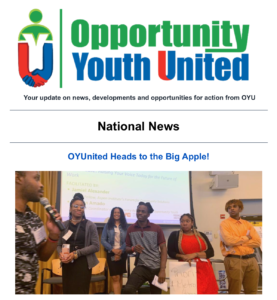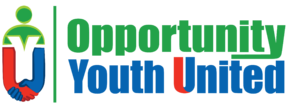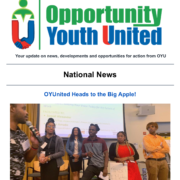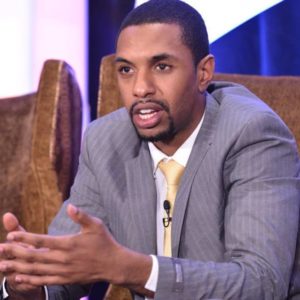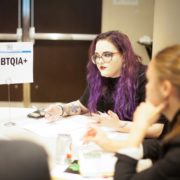By Amanda Shabowich
The first the first professional conference I ever attended was a totally new experience for me. I was 21 and I had never really traveled without my family or friends. I had definitely never been anywhere like Aspen, Colorado, and I had never presented anything about my work outside of my own city.
I was proud of our work in Boston, but at the conference, I had so much anxiety about being in a space with so many people, very few of them were around my own age, that it was hard to relax and share our story. It seemed like everyone already sort of knew each other and on top of that, the agenda for the convening looked like a college class schedule I was trying to navigate, which felt overwhelming. It seemed like there was no one I could turn to to ask questions or be reassured in what I thought I was supposed to do.
What turned the whole conference around for me was being welcomed warmly by people who recognized me and told me they were excited to meet me. Some people introduced me to others and created space for me. I could ask my questions, attend sessions with familiar faces, and didn’t have to sit alone at breakfast the next morning.
Now, years later, I feel like I am on the other side of things. I look forward to convenings, I know what to expect, I know which friends I’ll be fortunate enough to see, and I know which of the “adult crowd” are our allies.
Still, every time I go to a convening, I see someone who has the same look in their eyes that I must have had when I attended my first conference—the scared and nervous feeling you try to hide so you can perform as your best “work-self.”
That’s why, as part of the planning team for the youth leaders portion of the Aspen Opportunity Youth Fund convenings, I wanted to create a resource for rising leaders who feel the same mix of nervousness and uncertainty that I felt when I first entered this space.
Working with others on the planning committee, I developed a “survival guide” to help new youth leaders feel more comfortable entering professional spaces. I gathered different kinds of advice and wisdom related to networking and leveraging professional spaces to your advantage.
Everything on this one-pager is not simply for young people, it’s created by young people.
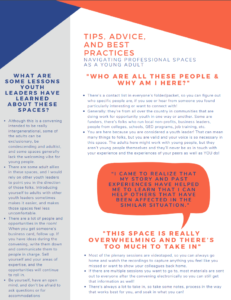
Download the Guide
This year, we gave the guide out to all the new youth leaders attending the Aspen Forum for Community Solutions conference in Philadelphia. During our youth leaders meeting, we had a deeper conversation about navigating professional spaces. We talked about our own definitions of what it means to be professional, how to take care of yourself, and how we can all best take information home to help guide our own work.
While there’s no roadmap or official guidebook for navigating professional spaces as Opportunity Youth, it’s definitely an ongoing conversation as more spaces welcome (or think they’re welcoming) young adults. It’s important for us to understand that there’s no solution that will make people immediately look past your age when you’re young, and there’s no quick fix for making one’s expertise marketable. But I think the more heads we put together, the more allies we can gain, and the more we talk about how we each try to wade through these waters will lead us closer to those answers and solutions.
Similarly, it’s important for the older generations to reflect on the opportunities they were given, how they used those opportunities to get where they are, and to be forthcoming with sharing that.
Advice to Other Young Adult Leaders
Networking: There is one element I don’t think I completely captured that has been pivotal to the opportunities I’ve been fortunate enough to receive: learning how to “sell yourself.” Networking with people is important, both personally and professionally. It’s not always a great feeling, but if you know what your work is and you can externally relay how much it means to you, it will matter to others too. Whether in meetings, at convenings, or attending community events, I try to bring up what I’m working on, what is exciting to me about it and why I think it’s necessary.
Saying Yes: I personally focus a lot saying yes to new opportunities, because saying “yes” to things I wasn’t totally sure about has helped me a lot. For example, at my first convening in Aspen, the facilitators asked me at the last minute to share some reflections on the big stage, in front of everyone, to close out the convening. I said yes before I could worry too much.
As much as having boundaries and being able to say no is crucial—especially as an Opportunity Youth navigating professional spaces—saying yes to anything that I want to throw myself into has allowed me to not only be invited into rooms I really want to be in, but to open the door myself.
You are IT: I think the most important thing is that young adults never lose their confidence, or if they do, never lose the ability to fake some. Act like you are it, because you are. This may be abstract to others but for us, it’s our lives, it’s our families’ lives, it’s our friends’ lives.
For those we serve, and for ourselves, we have to demand opportunities, and we have to take up space, not just because we can, but because we deserve to.
—
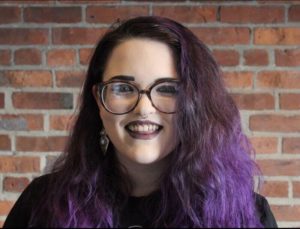
Amanda Shabowich (she/her) is currently serving as the Youth Voice Project Coordinator, the Alumni Coordinator at Boston Day and Evening Academy, and a co-lead of the Boston Community Action Team. Amanda began with Youth Voice Project in April 2015, and was able to become an advocate for resources for out of school youth, plan and host youth-centric events, and build partnerships with other youth-serving organizations across the city. She has spoken about her work across the country, as well as designed and led workshops on the importance of amplifying Youth Voice through storytelling, self-care for opportunity youth, designing inclusive youth programming, and inter-generational relationship building. Most recently, she served as a Youth Facilitator & Content Consultant with the Rennie Center for Education Research & Policy on their OY Career Pathways Project and was selected as a Youth Fellow for the Youth Transition Funders Group in the Economic Well-Being Working Group.
